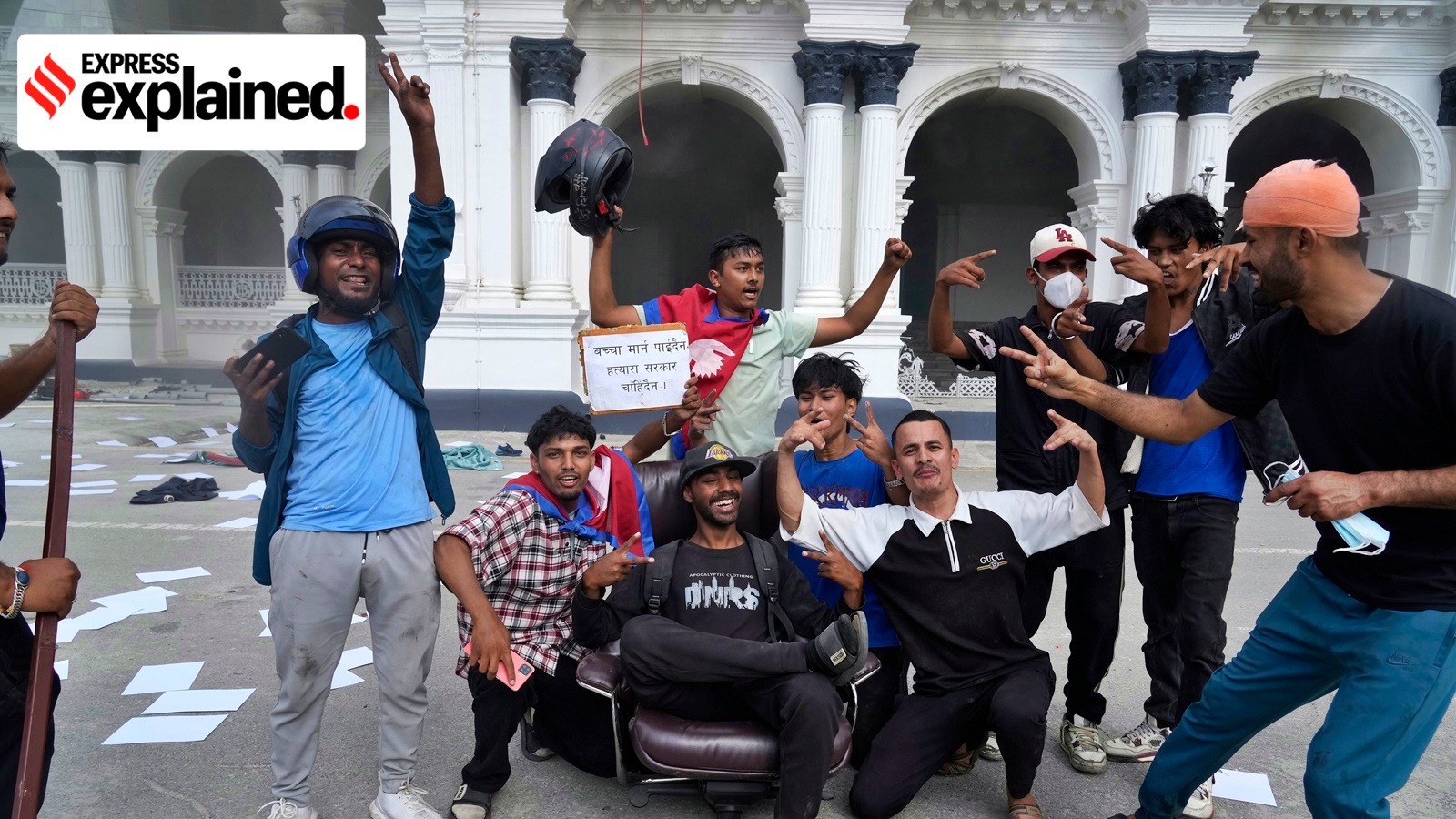“No More Nepo Babies – We Demand Fair Opportunities!” read one banner at Nepal’s youth-led protests, which transformed into an expression of anti-establishment public anger over the past week. Key leaders have been unseated after decades of political instability and corruption, with the slogan capturing the frustrations of the youth.

 Nepali youth holding a banner on nepotism and corruption during recent protests. (Via X)
Nepali youth holding a banner on nepotism and corruption during recent protests. (Via X)
In India, the first instance of people googling “nepotism” on a significant scale was in early 2017, peaking in May 2020.
What does nepotism mean?
The word originated in the mid-17th century from older European words — French népotisme and the Italian nepotismo, which came from the Latin nipote, meaning “nephew”.
Charles Sumner, a 19th-century US Senator, wrote that it first appeared in Rome, when the Pope’s power rose: “It served to designate the authority and influence exercised by the nephews, or more generally, the family of a Pope”. Nepotism occupied such attention even in the 1600s that it became the subject of the book Il Nipotismo di Roma, “which is full of instruction and warning” against the dangers of favouring familial connections over merit.
Notably, many religious leaders in the Catholic Church who had children despite taking vows of celibacy would also introduce them to the world as their “nephews”.
The word has equivalents across languages, such as bhai-bhatijawaad in Hindi (literally, rule of the brother and nephew). Most early societies were feudalistic, with little interest or incentive in practising the values of democracy and equality. Limited resources also meant that those who gained power would do their best to retain it.
Story continues below this ad
Why was the term “nepotism” used to refer to film industries?
In India, the term first gained traction in early 2017, after Bollywood actor Kangana Ranaut used it to describe director Karan Johar on a talk show. She called him a “flagbearer of nepotism”, saying he was dismissive of film industry outsiders like herself.
The comment immediately evoked discussion because it seemed to contain a kernel of truth, in that audiences routinely saw children of celebrities enter the industry with ease, while skilled and talented “outsiders” struggled to find space. Similar to Nepal, the issue was not viewed as one person simply following in their parent’s footsteps, but them unfairly taking away another person’s opportunity.
However, the other view was that it was natural for parents to want to help their children and that films were being unfairly targeted as a highly publicly visible profession. With the continued hold of caste networks, particularly upper caste dominance in lucrative jobs, nepotism is the norm in Indian society. In business, politics or the bureaucracy, people in power are known to promote their kin through direct and indirect ways. In national politics, too, the early 2010s saw backlash against what were termed entitled and age-old political dynasties. The BJP has attacked “political dynasties”, even though several of its own leaders have been promoting their offspring in politics.
The debate later played out in the US, aided by a December 2022 New York magazine report that named “nepo babies” in the film context. It said the stir began with the pandemic, which “supercharged the backlash against celebrities”. Celebrities documented themselves on social media, quarantining with their families, and their lifestyles contrasted with that of the masses, many of whom were laid off or facing uncertainty then.
Story continues below this ad
 The December 2022 New York magazine cover on “nepo babies”.
The December 2022 New York magazine cover on “nepo babies”.
An additional factor was the revelations of the Varsity Blues scandal in 2019, in which celebrities and white-collar professionals gamed the system to admit their children into prestigious colleges, including those from the Ivy League.
The NY magazine article noted how nepo babies got that crucial foot in the door. It cited author Fran Lebowitz, who once wrote, “Getting in the door is pretty much the entire game, especially in movie acting, which is, after all, hardly a profession notable for its rigor.” She also “brought it up as a metaphor about structural racism”, where fitting the mental image of who should wield power (say, White individuals and well-off celebrities) was enough qualification to enter the system.
In India, the suicide of Bollywood actor Sushant Singh Rajput, who did not hail from a film background, revived the discourse in 2020. Social media users blamed nepotistic power groups in the industry for his demise, with little evidence, unleashing online trends like #boycottbollywood.
Many pushed back at the time. Writing in The Indian Express in August 2020, filmmaker Kabir Khan and public policy analyst Rohan Sandhu wrote that nepotism was a larger Indian phenomenon. “According to a 2019 Oxfam report, India’s richest 10 per cent own 77.4 per cent of the national wealth, while the bottom 60 per cent own less than 5 per cent,” they said.
Story continues below this ad
They also noted the peculiar economics of filmmaking, which is a costly endeavour with a low success rate. “Inevitably, formulaic films with known names are both easier to finance and distribute. Producers start viewing “star kids” as financially more viable compared to rank newcomers. Even before they are launched in their first films, they have millions of followers on their social media handles…” they wrote.
Why do criticisms of nepotism continue to be made?
From the anger directed at the entertainment industry, Nepal’s case shows a shift towards the children of politicians. Something similar is happening at a smaller scale in the Philippines, where investigations recently revealed diversions of billions of pesos from flood control projects over the years. It has led to online criticism of the luxurious lifestyles of “nepo babies”, or the children of contractors and public officials who allegedly profited from the corruption.
Why nepo babies are inspiring previously unseen levels of anger is a subject of ongoing analysis, but rising wealth inequalities are often held up as part of the explanation. This is a pattern being witnessed globally, due to similar economic systems in place. Social media further offers a deeper look into the lifestyles of the rich and the famous, and the ability to comment on them.
As Nepal shows, the continued prevalence of power skewing towards a few groups can have lasting consequences. In this regard, Sumner praised the moral code of US President Thomas Jefferson, who once wrote to a relative, “Toward acquiring the confidence of the people, the very first measure is to satisfy them of his (a leader’s) disinterestedness, and that he is directing their affairs with a single eye to their good, and not to build up fortunes for himself and family.”



 Nepali youth holding a banner on nepotism and corruption during recent protests. (Via X)
Nepali youth holding a banner on nepotism and corruption during recent protests. (Via X) The December 2022 New York magazine cover on “nepo babies”.
The December 2022 New York magazine cover on “nepo babies”.



































